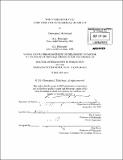| dc.contributor.advisor | Rae Langton. | en_US |
| dc.contributor.author | Robichaud, Christopher J | en_US |
| dc.contributor.other | Massachusetts Institute of Technology. Dept. of Linguistics and Philosophy. | en_US |
| dc.date.accessioned | 2011-12-09T21:26:22Z | |
| dc.date.available | 2011-12-09T21:26:22Z | |
| dc.date.copyright | 2011 | en_US |
| dc.date.issued | 2011 | en_US |
| dc.identifier.uri | http://hdl.handle.net/1721.1/67573 | |
| dc.description | Thesis (Ph. D.)--Massachusetts Institute of Technology, Dept. of Linguistics and Philosophy, 2011. | en_US |
| dc.description | Vita. Cataloged from PDF version of thesis. | en_US |
| dc.description | Includes bibliographical references (p. 91-96). | en_US |
| dc.description.abstract | The three chapters of my dissertation develop and defend a new Humility thesis, Categorical Humility. Humility theses tell us there is some fundamental aspect of the world that we lack knowledge of. All such theses share two parts: an existence claim, stating that there is in fact this portion of the world, and an ignorance claim, stating that knowledge of it escapes our epistemic grasp. In Chapter One, co-authored with Rae Langton, I sketch the landscape over which current interest in Humility theses has focused its attention. Specifically, Rae Langton's Kantian Humility and David Lewis's Ramseyan Humility are concisely presented, motivated, and defended against a variety of objections. This chapter is meant to orient the reader to the shape of the debate and to set the stage for my own view, Categorical Humility. I turn to motivating that view in Chapter Two, where I develop it in the context of a more detailed examination of Ramseyan Humility, its nearest ancestor. My overall strategy is to establish a stronger conclusion than Lewis does by nevertheless employing weaker premises. I argue that our ignorance amounts to more than us not knowing the identities of the fundamental categorical properties; it also amounts to us not knowing whether these properties are physical or mental. Chapter Three considers two challenges to Categorical Humility, one that attacks the ignorance component of the thesis and one that attacks the existence component. And two important conclusions emerge from my response of these objections. The first is that Categorical Humility is incompatible with physicalism, at least as physicalism is often articulated. The second is that a certain meta-Humility thesis is true; namely, there's a fact of the matter about whether, say, dispositions are necessarily connected to their categorical bases, but we can't come to know what that fact of the matter is. I conclude by clarifying how my own defense of Categorical Humility should be understood in light of this meta- Humility thesis. | en_US |
| dc.description.statementofresponsibility | by Christopher J. Robichaud. | en_US |
| dc.format.extent | 96 p. | en_US |
| dc.language.iso | eng | en_US |
| dc.publisher | Massachusetts Institute of Technology | en_US |
| dc.rights | M.I.T. theses are protected by
copyright. They may be viewed from this source for any purpose, but
reproduction or distribution in any format is prohibited without written
permission. See provided URL for inquiries about permission. | en_US |
| dc.rights.uri | http://dspace.mit.edu/handle/1721.1/7582 | en_US |
| dc.subject | Linguistics and Philosophy. | en_US |
| dc.title | What lies beneath? : a defense of categorical humility | en_US |
| dc.title.alternative | Defense of categorical humility | en_US |
| dc.type | Thesis | en_US |
| dc.description.degree | Ph.D. | en_US |
| dc.contributor.department | Massachusetts Institute of Technology. Department of Linguistics and Philosophy | |
| dc.identifier.oclc | 761868709 | en_US |
